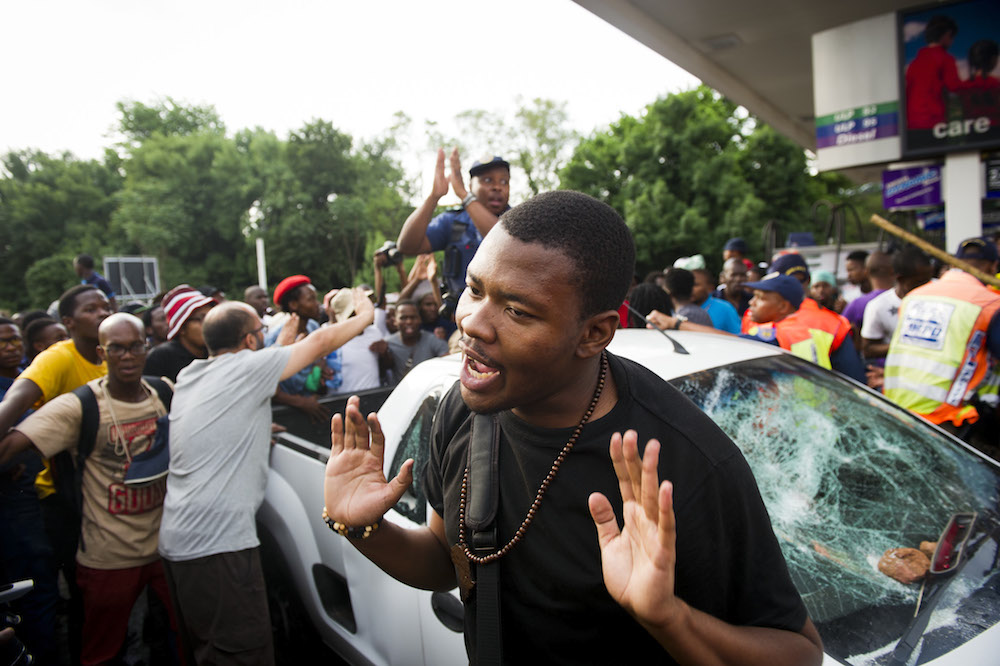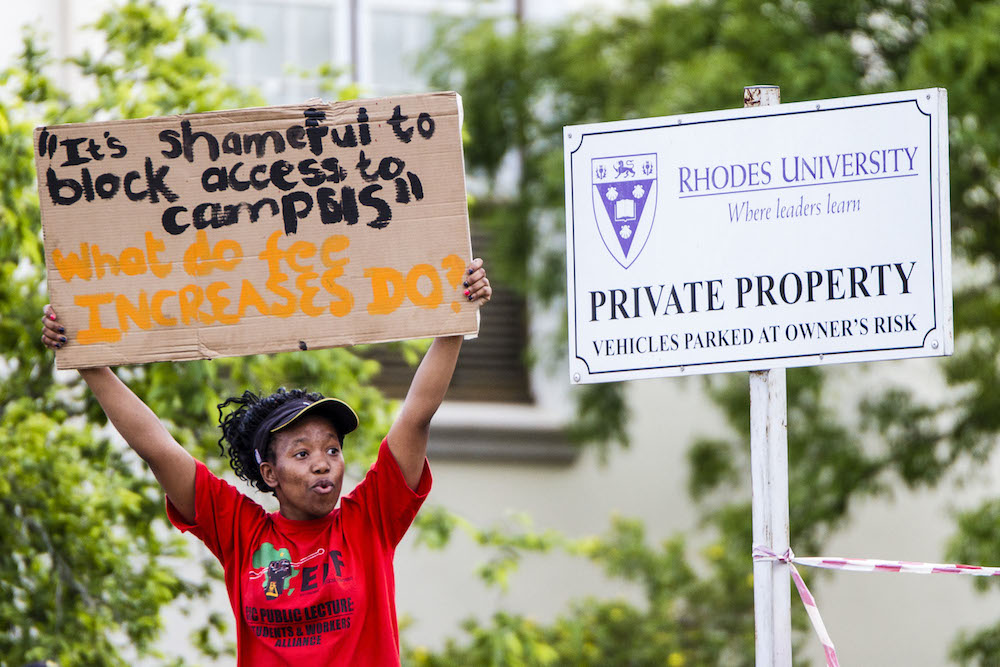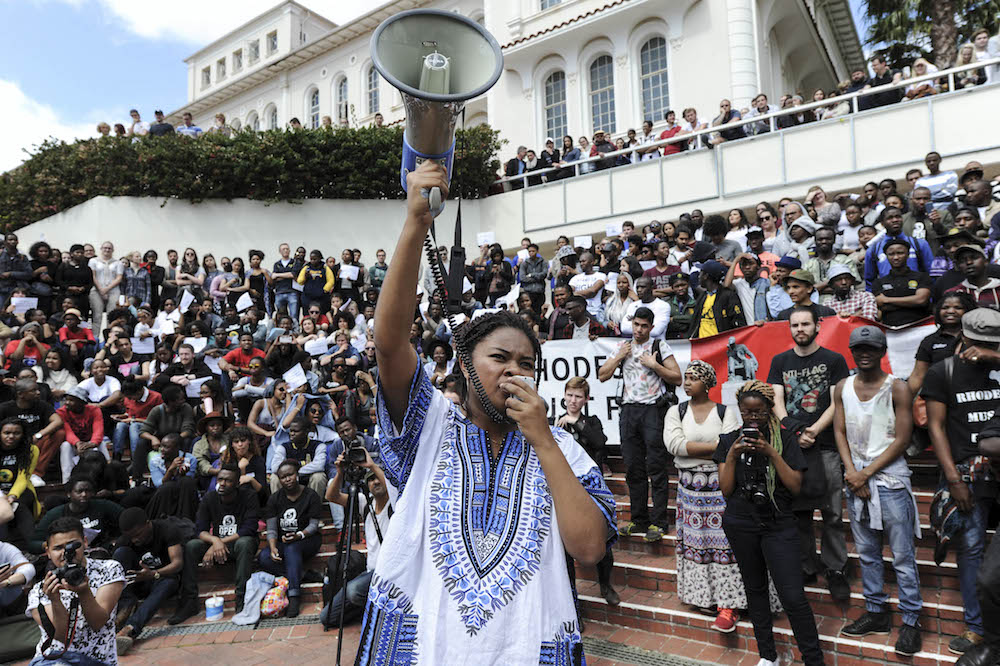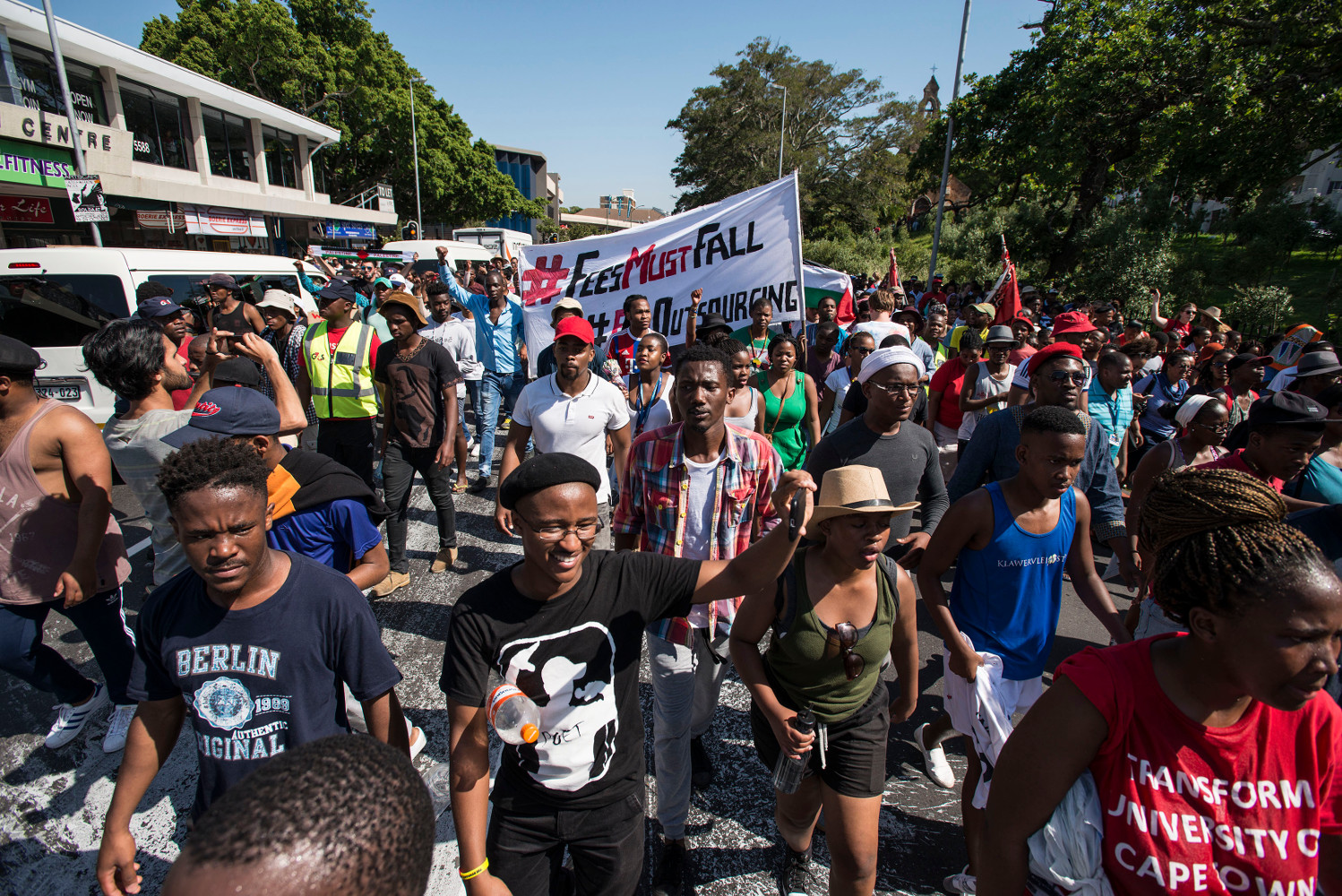At the heart of the student protests across South Africa is the immediate question of the right to learn.
Choosing to adopt tactics that have forced institutions to shut down and preventing learning from happening in its usual ways, protesting students have come under fire for interfering in the lives of those who choose not to participate in campaigns that are said to affect ‘a minority’.
They have been chastised by their vice-chancellors and Minister of Higher Education Blade Nzimande for infringing on the rights of other members of their university communities to engage in “the academic project”. And in the usual sensational style of the mainstream media, the actions of students have been characterised as “violent”.
But anyone who takes the time to listen closely to what the students are saying will know that their actions are not ill-considered, and that their immediate struggle against fees increases is imagined as part of a much bigger struggle against a system that they characterise as violent and speak of as experiencing in violent forms in their everyday lives.
As a lecturer who has spent the greater part of the past week with students engaged in struggle at the University of the Witwatersrand (many of whom I have taught over the past six years), I have been inspired by their individual and collective courage and resolve.
As they argue, the right to learn is compromised every day for poor black students in many different ways by a system that is shaped and driven by business principles.
At the same time they argue that what is being learnt and how it is being taught need to change as the colonial and apartheid cultures of learning, teaching and knowledge production remain intact.
Their actions, then, are directed towards disrupting the normal functioning of a system that, they argue, does violence to them as students and to black people generally.
For a while, then, their right to protest allows them to disrupt the usual ways in which the right to learn is given effect to, asking how it might be that this right can be put into effect for us all regardless of our ability to pay for it.
In doing this, they have also succeeded in putting on the national agenda once again the important question of what a public university in Africa today should be, the values it should uphold, the kind of education it delivers, and the kinds of knowledge it produces.
#FeesMustFall has as its main demand that higher education be free. The compromise that it is willing to accept is that there be no fees increases in 2016.
Though some have been quick to criticise students as being “entitled” and refusing to accept the tasks of managing a constrained national budget, the demand for free higher education is a demand for a completely transformed imagination of the higher education system and its role in society.
This is reflected also in the fact that the struggles and demands of workers as part of university communities have been central in the protests of students. At both Wits and UCT, outsourcing has been a central target of student campaigns, with October 6 marking the start of actions at the former campus.
While the issue of fees increases might be resolved in the immediate term, but the discussion about free higher education forces us to reopen a national debate that the student movement lost in the mid-1990s when transformation became reduced to a series of technocratic interventions, and the representation of different constituencies (or “stakeholders”) in institutional processes and structures increasingly began to dominate the discussions about and approaches to transformation.
As this happened, our struggles for changing the very nature of structures of governance such as councils, curricula, forms of learning and teaching, and a decommodified system overall, slowly disappeared. As students problematise the state of transformation today, arguing that current technocratic agendas do not serve the interests of a majority of students or society more generally, it is perhaps time for us to revisit some of the decisions that were settled on in the past.
Key to this should be a reopening of discussion about the ways and forms of governance at the institutional level. At Wits, the defeat of student representatives in council around the proposed fees increase has resulted in the student leadership and general student body questioning the make-up of council once again, and insisting on the ratification of any decision around fees by a university assembly, a formation imagined by protestors as an alternative, open, democratic space constituted by all members of the university community.
Although such a space is yet to be constituted, there has been talk at student meetings about the need to think more seriously about what such a form of collective engagement would entail in more concrete terms.
At the same time, conversation has to be reopened at both national and institutional level (and across them) about the funding crisis.
In spite of Nzimande denying that there is a crisis, the fact that students have mobilised sufficiently to shut down institutions countrywide confirms that something new has to happen for this not to be repeated next year on a bigger scale.
In truth, the crisis has existed since the transformation project began, as a result of a series of compromises in concretising its goals and objectives, handing over any possibility of “opening the doors of learning and culture to all” to the logic of the market.
Students are forcing us to acknowledge that resources need to be mobilised in different ways and the transformation project opened up in more democratic ways. We need to listen to them – and learn from them.
Prishani Naidoo has lectured in sociology at the University of the Witwatersrand since 2008
Wits: ‘Who are the real hooligans here?’

We don’t owe you Foucault: Students can engage in academic discourse, but that won’t dilute their anger. (Delwyn Verasamy, M&G)
It is a common error of thought that violence is only what you can see. Condemnation arrives in record time when a tyre is burned, a building torched or windows broken; however, silence arrives just as quickly when students speak of the violence committed against them daily.
It is violence when an institution shuts its doors to a student because their parents don’t share in the wealth of this country. It is violence when examinations become a privilege only the rich can afford and it is violence when universities pay parents of these students R2 700 a month and expect them to fork out R10 000 in January, just to register.
Somehow, in the psychology of the elite, that violence is normal. Caring about the state of old tyres is more important than the state of black youth. How easy it is to say students at institutes of higher learning, deemed smart enough to write papers on Foucault, are the same students who are called “mindless” when their anger inconveniences you.
How intellectual is the argument that student protesters – who, in one day, are beaten, run over by cars, threatened with guns and knives, teargassed and pepper-sprayed by the police – are hooligans?
Universities put in student leadership to fill chairs and eat catered lunches, not for meaningful engagement. Engagement assumes that a legitimate argument that is offered against the system has the power to change the system.
It doesn’t. If it did, we could have talked our way out of apartheid.
Remember when you told your younger sibling they could play Super Mario with you but you unplugged their controller? Did you think they wouldn’t find out? Did you think they’d give you a hug when they did? Did you “intellectually engage” with them before you unplugged it? Exactly.
Universities commit violence: physically and symbolically, against students. Who are the real hooligans here?
Make no mistake: students read, they can articulate their argument, they have developed tools of analysis. But they can also chant, sing and smash the walls they’ve been talking to. One need only visit Solomon Mahlangu House at Wits, Winnie Mandela House at Stellenbosch, Azania House at UCT or Amina Cachalia House at Rhodes to see it. – Pearl Pillay
Pearl Pillay is doing her master’s in political science at Wits University and she directs Youth Lab
Rhodes: Tarred by the media and brutalised by the police

No go: Rhodes students have been the target of lazy and reckless reporting by the mainstream media. (Paul Greenway/ 3P Photography)
Black students at Rhodes University have been engaged in peaceful mass demonstrations concerning the high fees they are expected to pay. Since after midnight on October 19, we have barricaded entry points across campus as part of a campaign to force the university to shut down.
These peaceful demonstrations are taking place alongside those on other South African campuses under the banner #FeesMustFall.
If we are to rely on mainstream media coverage of these demonstrations one would believe that they are nothing but acts of vandalism and disruption at one of the most crucial times in the university calendar.
This lazy and reckless reporting does not come as a surprise. It is a reflection of the usual reading of black bodies in spaces they are not allowed access to, nor allowed the freedom to articulate themselves in the manner they choose.
Once black people operate outside the confines of colonial policing, as has been the case at Rhodes University and other campuses, we are immediately met with extreme repression and slanderous reporting. This is journalism that does not call into question the problematic and colonial tropes used to describe black bodies that students have been subjected to this week.
We’ve been described as irrational, childlike, violent and threatening. And such tropes feed into further dangerous “education is a privilege not a right” rhetoric, which leaves black students out in the cold and makes access to higher education the luxury of the rich, mostly white, students of this country.
Since this past Monday, students have been threatened with use of maximum force by the police deployed to quell the “racist storm” sweeping the campus.
Rhodes students have stood in solidarity with students protesting at Eastcape Midlands College, where students were shot at with rubber bullets and subjected to stun grenades and water cannons.
We agree with mainstream media that these protests have been violent: the police have used apartheid methods of containment to intimidate students from fulfilling their mission of ensuring lower fees.
It has been institutions of higher learning that have, without blinking, called on the police to take action against peaceful and unarmed students seeking to put an end to the system of paying high fees, so that no black student is barred from accessing higher education. – Ntombizikhona Valela
Ntombizikhona Valela is a master’s student in history at Rhodes University
Stellenbosch: Universities need the right leadership

Fury: Students of the Open Stellenbosch movement scorn the ‘old white men’ who run their campus. (Leanne Stander/Beeld/Gallo Images)
Demonstrations are emotionally draining, physically tiring and time consuming. Yet we must protest: the commodification of education in higher learning violates the founding principles and values of this country’s democracy as envisioned in the Freedom Charter and Bill of Rights.
Access to quality education is fundamental for a society of substantive equality. It ought to be afforded to those who need it the most: the poor.
The proposed 11.5% fee increase at Stellenbosch University will serve to maintain the status quo of excluding those who by accident of birth found themselves black and/or poor.
Consequently, the systematic superiority and oppression of gender and racial groups that tore this country apart will never be addressed.
We call on Stellenbosch University not only to suspend the fee increase, but to decrease the fees, given the university’s large financial reserves.
If the government is serious about ensuring development of our country, it must expand the budget it allocates to higher education. Otherwise, meaningful transformation will not happen because the previously disadvantaged and underprivileged who form the majority of the country will not have the opportunity to participate in the country’s development. Moreover, broadened access will go a long way toward ensuring that higher education is transformed.
But, to achieve this, the right leadership is needed. Stellenbosch University’s management comprises old white men who are still caught in the past. Moreover, most of the older generation in management are too detached from South Africa’s poor to understand the current situation. They are not willing to remedy this detachment by humbling themselves and listening to us.
As students we haven’t had a chance to heal from the pain of the past. That is why we want to reimagine universities as places of epistemic healing. We don’t trust the old system: it is inherently exclusionary. – Marc Rudolph & Mathume Majaletje
Marc Rudolph is an activist, a Sasco member and the secretary general of the SRC at Stellenbosch University, studying a BCom (LLB). Mathume Majaletje is a second-year development studies student and a member of the Open Stellenbosch movement
UCT: The ripple effect of education

Fault lies more with government and less with university administrators. (David Harrison)
If I have a look at the role tertiary education has had in my life, I simply cannot discount its life-changing abilities.
After my father was afforded the opportunity to study, he could put my mother through university and in turn all of their children. Through one person being educated, four more people were saved from poverty and became contributors to the tax-base rather than burdens on it.
This could have been the case for more of my father’s siblings but opportunities were scarce under apartheid. The unfortunate outcome is some of their offspring have often turned to a life of crime because of poverty.
If we no longer want to live in one of the world’s most dangerous countries, with the dubious honour of being among its most unequal societies, we should all be serious about education – for all. We should either be joining the protesting students or applauding them from the sidelines. Unfortunately, however, fault lies more with government and less with university administrators.
There is a reason why universities are expensive and that is because they require highly qualified staff and need to be run much like municipalities that require constant upgrades of infrastructure and maintenance. This is not an inexpensive undertaking and is funded through government subsidies, fees from students and a “third-stream income”, usually in the form of fundraising.
The real reason universities constantly have to increase fees is that the government subsidy is not adequate in South Africa. It currently sits at around 0.6% of gross domestic product and is much lower when compared with other emerging nations such as India (1.3%), Russia (1.8%) and Saudi Arabia (2.3%). Our spending on higher education sits at a mere 12% of education as a whole, whereas the continental average is 20% and the global average 19.8%. This is inconsistent with the fact that we are one of the highest spenders, in terms of GDP, on education as a whole.
If students force their university leaders to lower fees, they will in turn put pressure on their biggest sponsors – the government – for more money. This pressure is necessary. As society at large, it is up to us to make sure we continue the protest at the ballot boxes to make sure that we elect a government that prioritises education and adequately invests in it. – Siya Mnyanda
Siya Mnyanda read politics and philosophy at the University of Cape Town, and works in the private sector
Anger in the Twitterverse
Twitter was ablaze this week as South Africans took to the platform to express their views on the student fees protests using a range of hashtags: #FeesMustFall, #BladeMustFall, #NationalShutdown, #RhodesMIP and #TeargasTips. Here’s a selection:
? The students of 2015 have an appointment with history. – @RamaMahapa
? If only there was some sort of elected official, a minister of higher education of some sorts, that we could turn to in a time of crisis. – @TshepiMolisana
? I don’t think the ANC has figured out that #NationalShutDown protesters are of legal voting age. –@phr0ggi
? I owe NSFAS +/- R150 000. How long is that gonna take me to pay it off? Coming from a working class family? #FeesMustFall – @Ncepsi
? Why’s government so quiet? This is a national crisis. [Is] government hiding behind police? #NationalShutDown – @jmw99
? 6th yr Med student. 2 scholarships. 3 loans. Worked since he was a teen. Hasn’t failed a single year. Still can’t cover fees. #FeesMustFall – @sboshmafu
? As students we are saying fees must be reduced to a figure that Zuma can read. #FeesMustFall #NationalShutDown – @CaptainKeigh
? And even with all my privilege, I turned down UCT because it was too expensive. So imagine what it’s like for the kid who has nothing. – @Ah_nayP
? The thought of #RhodesMIP that I paid for 6 years makes me cry. I am sinking in debt and I am nowhere near finishing paying my study loans. – @Urban_Xhosa
? #TearGasTips use milk on exposed flesh. Water makes symptoms worse. – @blkliquidfluid
? Man it’s so lit, so beautiful. What a time to be alive, black, a student and in South Africa this 2015!! #NationalShutDown – @M4KV7V75A
? If you think this is not your battle, you are mistaken. You’ll need graduates for your business, your kids will need education. #FeesMustFall – @firdausk01